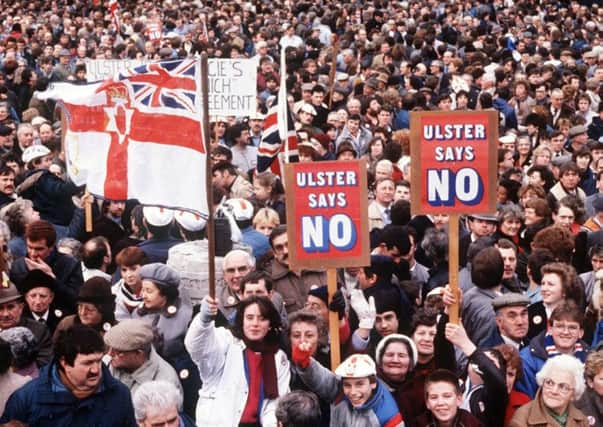No wonder unionists are nervous about backstop: they remember the Anglo Irish Agreement


The arguments are now well rehearsed and most of the energy as we reach the end point of the negotiations seems to be going into developing a form of ‘constructive ambiguity’ over the phrasing of the eventual Withdrawal Agreement. This has been a feature of British diplomatic statecraft for some time and essentially requires drafting of text that can be read in different ways to allow progress to be made on the journey, without absolute certainty over what the ultimate destination is going to be.
However, this is going to be tricky to engineer in the Brexit context, as the experience of the negotiations has sucked trust out of the process to the point that nearly all sides want legal clarity now, rather than ambiguity.
Theresa May has a choice between three options.


Advertisement
Hide AdAdvertisement
Hide AdShe can agree to full regulatory alignment within Ireland – with the result being some form of border controls in the Irish Sea.
Her second option is a mechanism that would align the whole of the UK with the Customs Union, effectively dragging GB back in, even when the UK formally leaves the EU in March 2019.
Both of these two options are versions of what is popularly known as ‘the backstop’.
They have recently been conflated as a paired option, confusingly referred to as the ‘backstop backstop’, with the Irish version nested within the UK wide one – a sort of ‘sleeper backstop’, possibly never activated, but an insurance policy for Ireland should it be needed.
Advertisement
Hide AdAdvertisement
Hide AdThe third option is to have no backstop, no deal, and no transition period.
This would be an interesting position for everyone, as much would depend then on how that would be operationalised by all sides. But its political and economic implications for Ireland, the UK, Northern Ireland and the EU would be potentially vast.
This third option is not really realistic, as despite the bluster from the Prime Minister, no deal is not better than a bad deal, for the UK, Ireland, or the EU as an institution.
As a result, Theresa May’s choice now amounts to ‘putting lipstick on the pig’ of her Chequers deal and deciding whether to accept the NI specific or GB versions of the backstop, before she parades the poor beast through Cabinet, Parliament and across Europe.
Advertisement
Hide AdAdvertisement
Hide AdThe reality of the options on the table is causing the government to leak oil now at a considerable rate, losing transport secretary Jo Johnson at the end of last week, and enraging the DUP with the suggestion that a border in the Irish Sea might be written into the Withdrawal Agreement after all, having previously said that this wouldn’t be countenanced by the British government.
It now seems that Theresa May is suggesting that this option might be written into the Withdrawal Agreement by the EU, even though it remains unacceptable to her – a distinction that is clearly of little reassurance to the DUP.
One of the reasons is that they know their history – as does everyone in Ireland – and the historical parallels are becoming ever more clear.
In the 1980s, unionists were led to believe that Margaret Thatcher was a unionist and regarded Northern Ireland as being ‘as British as Finchley’.
Advertisement
Hide AdAdvertisement
Hide AdShe had watched as 10 republican hunger-strikers (including one serving Westminster MP) starved to death in the Maze prison in 1981, despite a crescendo of international criticism.
She fought Argentina in 1982 over the right of a community in the Falkland Islands to remain British.
In 1983/4 she faced down Arthur Scargill and the National Union of Mineworkers – ruthlessly destroying the mining industry in the UK while simultaneously devastating the trade union movement in Britain.
After lunch, the Iron Lady took on the Soviet Union, privatised the major utilities in the UK and then turned around and placed Northern Ireland onto the ‘window ledge of the Union’ – as unionists depicted it at the time by signing the Anglo-Irish Agreement in 1985 with the government of the Irish Republic.
Advertisement
Hide AdAdvertisement
Hide AdWhy – because British political interests over security and international reputation demanded it.
Theresa May of course is no Margaret Thatcher, but the idea that this weak and pragmatic Prime Minister, who does not even believe in the project that she is doomed to carry through, will demonstrate principle, where Thatcher did not – seems a little fanciful.
She may conclude that her best chance of getting a Brexit deal through parliament is by opting for/conceding to backstop option number one, with border controls in the Irish Sea – rather than dragging Team GB back into the Customs Union and enraging more Brexiteers in her party.
It is likely that while applying lipstick to the pig over the coming days, there will be efforts to add some additional mascara here and there to disguise its more obvious flaws, in an attempt to make it more attractive to her Cabinet, her party, the country and the DUP – but none may fancy this one in the end.
Advertisement
Hide AdAdvertisement
Hide Ad• Feargal Cochrane is vice chair of the Political Studies Association and professor of International Conflict Analysis at the University of Kent. He is director of the Conflict Analysis Research Centre and deputy head of the School of Politics and International Relations at Kent. His current research is examining the impact of Brexit on the peace process in Northern Ireland and its devolved institutions.